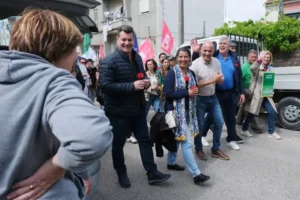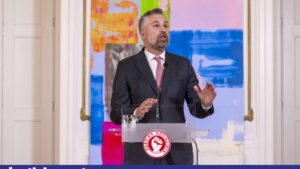CDS’ sole MP open to ‘swinging balance’ to PSD advantage
The poll almost a week ago was ‘spot on’: it saw Madeira’s PSD government returning, potentially with an absolute majority, and this is practically what has happened.
In what PSD leader Miguel Albuquerque has called “the biggest vote ever” since he took over party leadership a decade ago, PSD won 23 seats in the regional parliament – just one short needed for an absolute majority. The crucial one seat looks more than likely to be ‘provided’ by CDS, the party’s long-term partner, which actually only managed one seat, anyway.
It is a result that has been welcomed by President Marcelo and lauded by the PSD national leader, and now caretaker prime minister, Luís Montenegro.
As for the rest of the results, they too fell pretty much in line with the poll – and will have caused a great deal of soul-searching among PS Socialists. For the first time, JPP – the Juntos Pelo Povo party (Together for the People) has overtaken PS, to become the second major political force on the archipelago with 11 seats in the regional assembly – two more than it had before.
PS has gone hang-dog into third place, losing three MPs – and CHEGA too has been hammered. It was CHEGA’s motion of censure that precipitated these snap elections, and thus the ‘karma’ now: the party has polled a third less votes than it did a year ago, and is down from four MPs to three.
IL (Iniciativa Liberal) has managed 2.17% of the vote, and clinched one MP, but PAN has crashed out. The only thing the poll seems to have got wrong was the possible return of CDU/PCP communists: they didn’t make it; nor did Bloco de Esquerda.
Thus, the next regional parliament will have six political forces (PSD, JPP, PS, IL, CHEGA, CDS), with PSD very much in the driving seat.
For Portugal’s caretaker prime minister, this was “an extraordinary victory” that shows the people “once again proved” that they know how to “resolve at the ballot box what politicians were unable to resolve in the legislative assembly”.
The pity is that snap elections have come far too frequently in Madeira in recent years (three in the last 18 months). Thus, hopefully, this result will spur politicians into ‘useful dialogue’ in future, and not to slamming doors and leaving the problem ‘with the people’.
Does this result have any significance for the country’s mainland elections in May, again elections that have been precipitated by opposition parties insisting the current government has no conditions to govern? Pundits will no doubt be giving their views on this for the next few days.




















